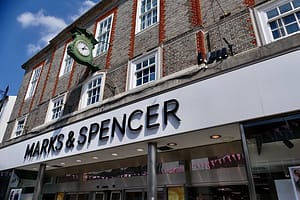Study finds
Consumer spending growth slowed as temperatures fell in March, rising just 2 per cent year-on-year – the lowest level since April 2016 – as the poor conditions brought by the ‘Beast from the East’ took their toll on the high street.
Data from Barclaycard, which processes nearly half of the nation’s credit and debit card transactions, shows that in-store spending fared particularly poorly, contracting 1.9 per cent as a third (34 per cent) of consumers reported the cold weather prompted them to spend less overall on the high street. Expenditure online grew by 11.7 per cent, however, as Brits chose to shop from the comfort of their own homes in the face of inclement weather.
Shoppers continued to prioritise the essentials, which rose 3.8 per cent, while spending on the ‘nice-to-haves’ increased by just 1.1 per cent. The strong performance in essentials was bolstered by supermarket spend (5.1 per cent) reaching the highest level of growth since June 2017, even as petrol spending declined 1.8 per cent year-on-year.
Bright spots in non-essential spending were restaurants and pubs, up 7.2 per cent and 7.7 per cent respectively. This was, however, a dip in growth compared to February (9.7 per cent and 10 per cent) and was also impacted by the cold weather – nearly half (45 per cent) of consumers said it led to them rein in on leisure and experience spending. Garden centres saw the biggest fall, contracting by a record 26.4 per cent as the ‘Beast from the East’ dashed any hopes of early planting.
Despite the slowdown in March, overall expenditure for the quarter was broadly stable with growth of 3.1 per cent in Q1, down only slightly from 3.2 per cent in Q4 2017 and matching the figure for Q3 2017.
Signs of stability also extended to consumer sentiment; 64 per cent of Brits are confident in their household finances, up 10 percentage points from the month prior and the best reading since October 2017. Likewise, the proportion of those confident in the UK economy rose from 34 per cent in February to 37 per cent last month, a seven-month high.
While these figures suggest reasons to be optimistic, however, it’s important to note that a meaningful minority of consumers feel worse off now than they did last year. Compared to 2017, a third (33 per cent) say they are less confident in their ability to save money for a rainy day, and a quarter (25 per cent) say the same about covering the cost of a night out.
All in all, a sense of caution still remains; 44 per cent of consumers indicate that they have adapted their spending to cope with rising prices and one in five (19 per cent) are shopping at discount stores more often, helping the likes of Aldi and Lidl to gain market share. The trend looks likely to continue – although the prevailing rate of inflation slowed slightly last month, nearly half of consumers (49 per cent) say they do not plan to change their spending habits any time soon.






Leave a Comment